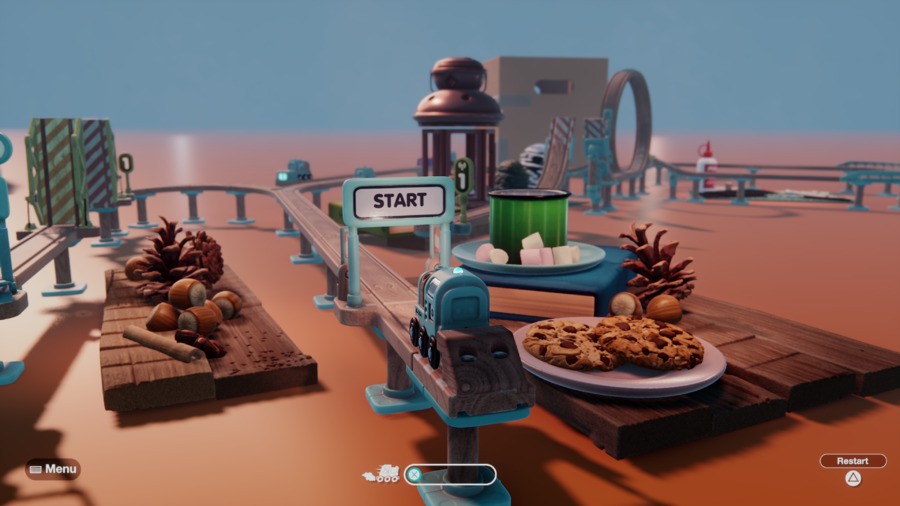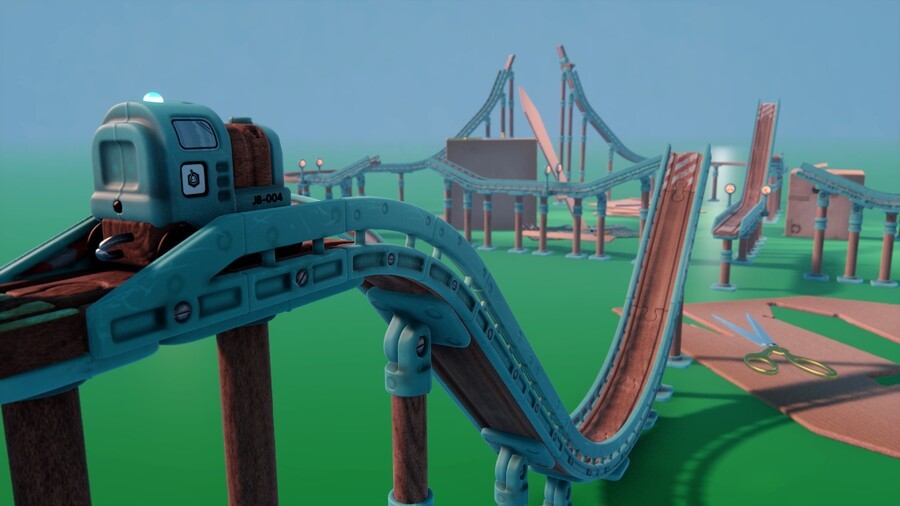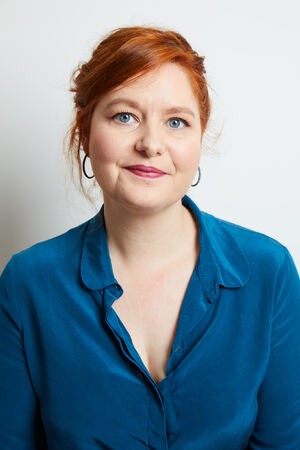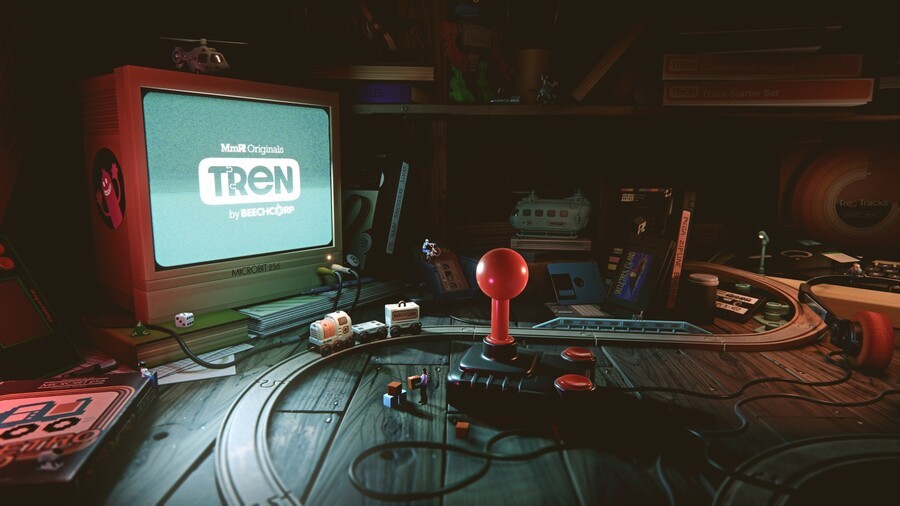
Media Molecule is on the verge of launching Tren, a brand new game all about a wooden train set. It's due to be released in Dreams very soon, and after spending time playing the adorable title ourselves, we were eager to pick the brains of its creators. In order to learn more about Tren, where it came from, and how it evolved, we sat down with the developer's recently-appointed creative director, John Beech, as well as studio director Siobhan Reddy.
The below interview is a combination of in-person and email responses, and has been lightly edited for clarity.
Push Square: What's the origin of Tren? Where did it come from?
John Beech: We were doing our Friday jams at work, we'd just started, and I thought to myself, what can I do? Some of the things that really interest me in Dreams are making stuff look and feel very realistic, like the Beech Breakfast. I was like, How can I put that into a game? And I thought, I really like doing wood textures. So I just made this random bit of track, looked at it and went, huh. There's a whole game there.
We weren't making a game yet — we'd just released Dreams. So I thought, what can I self-initialise? How can I make a triple-A game on my own? Well, a track system makes sense because I can build the levels from these pieces; if I get people to help later, it's expansive, it's very easy to add people — Tren could be huge, or very small.
And I could focus on the thing I really liked, which is mechanical engineering, and toys. I'm really into painting miniatures and stuff like that, so it really satisfied my craving for that. I really used to love playing trains with my dad. And my dad still, every day he sends me photos of his new layout that he's built in his shed. He has three sheds, for trains. You know, that's all he does. And then, Betty, my first daughter, was due around the corner and I said, you know what, I'm gonna play trains with her, which she now does, she has train sets all over the place now.
And so it just became a really personal thing. It became very easy for me to call upon inspiration, because really, I was just thinking about my life. I mean, it's as simple as that, really. And then when other people started joining, when it became bigger, they just brought their lives into it, too.
Could you talk a bit about the game’s structure, its modes, etc.?
JB: Tren is comprised of many interlinking modes and areas to explore. When I began to design Tren, I knew I wanted to facilitate the way adults played with toy trains (slow, realistic, more puzzley, and about carefully using the vehicles to complete set tasks), but also for kids who just want to zoom around as fast as possible and crash into everything.
With that said, it means we have the challenge levels, which are short, often action-packed and against the clock, where stunts can get you better scores, but we also have non-timed, more puzzle-centric challenges that require a bit of cranial action to complete. There are also a few survival levels where you need to last as long as possible (a staple of LittleBigPlanet).
On top of that, there are a bunch of what we affectionately call "special levels" where the rules of Tren are often bent and even broken!
Then there's a photo mode for you to really explore some of the fun moments in Tren. And finally, there is a huge area called "play & edits" where you can learn how to use the Tren kit in edit mode to make your own incredible Tren creations to share with the world!
Similar games to Tren normally operate as simulations, often about building successful, efficient transport networks. What was behind the decision to make the main bulk of the game challenge-based levels?
JB: When I set out on Tren, there was a possibility I could go down that route, but as I was making the early prototypes that use the Dreams physics engine, I realised that zooming around and crashing was more fun, at least for me at the time. Including a complex resource management mode at that stage was outside of my initial scope, as I was initially building Tren on my own in my spare time.
It was also an area I wasn't familiar with as a designer, but what I was familiar with was great feeling platforming and vehicle controls, so in a very pragmatic sense I decided to explore that route first.
But, what's great about Tren is we are releasing the kit, all the components, logic and art to the Dreams community. That means I have no doubt, someone will take the Tren set and do just that with it, and for me that is incredibly exciting!

As you mentioned earlier, the game is full of references to your own life and things that you care about. There's little dioramas in there, playing card houses, dice, D&D character sheets and stuff like that. What does it mean to you to see that stuff represented in the game?
JB: Yeah, just seeing everyone playing it right now is incredibly exciting. And the remit, when anyone joined the Tren team, was just, get as much of you as you can in there, put easter eggs in there. Is there a name that means something to you? Pop it on the side of one of the books. Is there a toy you're really into? Put it in there. And so, there's a bunch of stuff that's about me, but there's a bunch of stuff about everyone else on the team.
And really we just wanted to evoke that sense of nostalgia, because everyone has a completely different childhood, right? There's some common themes and whatnot, but because everyone on the team put parts of themselves into it, it really then hits so many buttons. When you start playing Tren, you go, oh, I had that toy. Oh, I used to roll dice. You don't think about dice, but then you see it next to a track. So, yeah, it's very much about enabling and empowering the players of Tren to have their own read on what's important to them.
Tren was officially announced a couple of years ago. What has changed during all that time? You said you've brought on a larger team to work on it, about 20 people right?
JB: Yeah, I think by the end. I mean, it's not like the last two years has been 20 people; initially when I started doing it, it was just me and a producer, and then I had one designer for like nine months, and then people started ramping up.
I think where it kicked into overdrive was with Jon Eckersley, the art director. He saw something in Tren, and he was like, I think you've got something there, John, and I have an idea of how I can help you, and he really came into that really sort of supportive role. He was like, this is yours, but I just really want to help express that.
But something really amazing happened when he joined, that wasn't just him supporting Tren; it became just as much Jon's as it was mine, and all the art direction really is him. I truly handed it over to him and that was part of that collaboration. He was like, I know what I want. I've seen what you've done, John, and it's really inspired me to do this. And he showed me the early concepts. He did something called a vis dev. He did it in like two weeks. He came in and I was just blown away. And that became the turning point of how we viewed Tren internally.
It wasn't just a collection of pieces, it wasn't just a playground anymore, it was a real, living, tangible thing. That was only enhanced as more people, like [Tom Colvin], the head of audio, when he started putting his sounds in there. That real visceral tactility, that's something that's really important to us at [Media Molecule], that sort of tactility. And I think it really became amazing.
So in terms of what's changed since [the announcement] — so much. Every aspect of the game has been changed. [Designer Steve Belcher], with his amazing feel for mechanics — the train can do backflips and stuff now, everything feels a lot tighter. It isn't just like a train game anymore. It's now like this action, platforming, puzzle... When you get to see some of the later levels, you'll see the other vehicles we've got in there and how far you can extrapolate out Tren.

You've almost treated this as Media Molecule's next game. And what I mean by that is not your next Dreams project, I mean your next game, in a sense. I was just wondering if there was any temptation ever to bring Tren outside of Dreams and release it as a standalone thing?
JB: I definitely wanted to push what we could do in Dreams. [Jon Eckersley] mentioned our combined experience in Dreams, so it didn't become about how [to make Tren]; we weren't really thinking about Dreams at that point. We just wanted to make a really, really good game. It was platform agnostic in that sense. We relied upon and used so many of the amazing things that we could do [in Dreams], physics and rendering and so on and so forth. So it was never a question of that. I just really wanted to make the best possible game. And as the lead on it, nothing else in my mind mattered at that point. That was not a question I was even entertaining. It was just, how do you make an amazing game?

Siobhan Reddy: I think for us it's been really wonderful watching people enjoy it. I think that's one of the things when you're making something, you get to go, oh, okay, cool, amazing. It's resonating with people in the same way it resonates internally.
Changing gears a little, I wanted to talk about Dreams itself. You're ending live service support in September. I was just wondering if you could talk a bit about why you came to that decision? How do you feel about Dreams looking back on it at this stage?
SR: We're obviously really, really proud of Dreams. And I think, Tren being the release we're making next is the thing that's been very galvanising for the studio, to kind of come together around that, because we're really proud of it.
We just sadly couldn't find a sustainable path for it. It doesn't mean we don't love it. It doesn't mean we're not super proud of it; we have just been blown away by what everybody has created, and are still creating.
So yeah, it's complicated because we are very, very proud of this beautiful thing that we made, but yeah, when we sat down and had a look at what we needed to do as a studio, we just couldn't find that sustainable path, so we had to make that decision.
We are still going to be supporting Dreams. So it is still there for people to keep creating with, and I think that there's some interesting opportunities there for people. A lot of the updates that we've done recently, it's been amazing to see people jump on board with those.
JB: Yeah, and the server update, so that increases the longevity of the server.
What are some cool community dreams you've played lately?
JB: A game just launched to the Dreamiverse called Cubille is incredible. It's a wonderful little puzzle game about wooden blocks and marbles, and if I didn't know any better I'd have said it was an extension of Tren! It shares a very similar aesthetic and plays wonderfully! I'm a big big fan and can't wait to see more from that team.

John — you landed a job at MM after your levels in LittleBigPlanet caught the team's attention, leaving the building trade for game dev. Over the course of 14 years, you’ve gradually worked your way up to creative director of the studio. Are you unstoppable? Actual question: How do you feel when you reflect on your journey at Media Molecule?
JB: Well, I'm not sure about being unstoppable, I've definitely had my fair share of ups and downs, but I've always been surrounded by the most excellent people I could hope to know, and every time they have helped me grow, progress and learn every step of the way. I feel incredibly privileged and honoured to be in the role I now find myself, it certainly would seem inconceivable to me when I first began this journey that I'd end up here.
When I look back at that journey it is full of so many wonderful moments and stories that I will always treasure. I've made so many close friends during this time, and for me that's probably the most important part — not the destination, but the people you meet along the way.
I hope this is not the end of the journey, I certainly have a lot more in me to keep travelling down that track to see where it takes me, and who it allows me to meet!
Now you're creative director, what is your vision for the studio and its games? What's the creative direction of Media Molecule under John Beech?
JB: I truly hope to embody our studio pillars of Inclusivity, Aspiration, Respect, Creativity, and Collaboration. These are not just words for us, they're very real in their action and how they relate to our work every day. I'm here to facilitate these pillars and empower the team I'm creatively leading.
The vision I have for the future of Media Molecule is less set by me, and more set by all of us who work here. I'm surrounded by so much incredible skill and talent, most of which exceeds mine in ways I can't even comprehend, so it's important that I listen to and rely on those resources to make sure we're doing the best work we can.
A huge thank you to John and Siobhan for answering our questions, and to Media Molecule and Sony for making this possible. Tren is releasing in Dreams on 1st August, the same day it hits PS Plus Essential. You can read much more about it in our preview through the link.





Comments 2
It would have been cool if media molecule had regular Dreams Jams.
The team all could be working on the next title but one week every 6months the team breaks up in sub teams to create something in Dreams.
It would have broke the monotony that working on the same project for years can bring whilst giving the supporters of Dreams, that little treat (I know we have had a few bit sonce launch. But it would have been nice to have it at a more regular basis even if it means its not as fleshed out)
Woah, Cubille is seriously cool. Thanks for this.
Show Comments
Leave A Comment
Hold on there, you need to login to post a comment...